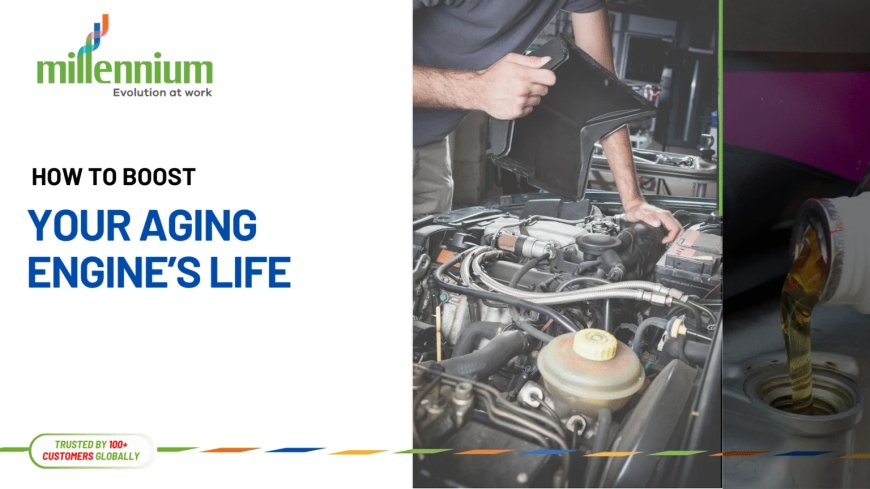How to Boost Your Aging Engine’s Life
An aging engine doesn’t mean the end of your car’s road life. With routine maintenance, smart upgrades, and careful driving habits, you can add years to your vehicle’s performance.

As vehicles age, their engines naturally begin to show signs of wear. But with the right care and attention, you can significantly extend the lifespan of your aging engine and keep it running smoothly for many more miles. Whether you're trying to save on the cost of a new car or just want to keep your beloved vehicle on the road, understanding how to care for an aging engine is essential. Here's a comprehensive guide to help you maintain performance and reliability in your older vehicle.
Common Signs of an Aging Engine
Before you can extend the life of your engine, its important to recognize when it's showing signs of aging. Some common indicators include:
-
Excessive exhaust smoke: Blue smoke may indicate burning oil, while white or black smoke can point to coolant or fuel issues.
-
Reduced fuel efficiency: If your car is suddenly guzzling more gas, it might be due to worn-out engine components.
-
Knocking or tapping sounds: These noises often suggest internal engine wear, especially in components like bearings or valves.
-
Loss of power: Sluggish acceleration or difficulty climbing hills could mean the engine is no longer delivering peak performance.
-
Oil leaks or low oil levels: A leaking or oil-burning engine can cause serious damage if not addressed promptly.
Catching these signs early and acting on them can prevent further damage and help keep your engine healthy.
Regular Maintenance: The Key to Longevity
Routine maintenance is the most effective way to preserve an engines performance over time. Here are a few essential tasks every vehicle owner should prioritize:
-
Oil Changes: Old oil becomes dirty and less effective at lubricating the engine. Stick to the manufacturer's recommended oil change intervals and consider using high-mileage oil for older engines.
-
Coolant Flushing: The cooling system helps prevent overheating and corrosion. Flushing the coolant and checking for leaks can prevent major engine damage.
-
Air and Fuel Filters: Replacing clogged filters ensures clean air and fuel are entering the engine, which improves efficiency and performance.
-
Spark Plugs and Timing Belts: Worn-out spark plugs or a damaged timing belt can lead to poor engine performance or total engine failure.
-
Regular Inspections: Routine checkups by a trusted mechanic can catch small problems before they become expensive repairs.
These simple habits can add thousands of miles to your engines life and prevent unnecessary breakdowns.
Upgrading and Replacing Parts to Boost Engine Life
In addition to regular maintenance, upgrading or replacing specific components can breathe new life into an aging engine.
-
Ignition System Upgrades: Installing new spark plugs, wires, or coils can improve combustion efficiency and engine responsiveness.
-
Fuel System Cleaning: Using fuel additives or getting a professional fuel system cleaning can remove carbon buildup and restore lost power.
-
New Gaskets and Seals: Replacing old, brittle gaskets can prevent oil and coolant leaks, which are major threats to engine health.
-
Aftermarket Radiators or Oil Coolers: These can help manage engine temperatures better, especially in warmer climates or under heavy loads.
If you're committed to keeping your vehicle for the long haul, these small investments can make a big difference in longevity.
Avoiding Common Mistakes That Shorten Engine Life
Even well-meaning drivers can make mistakes that accelerate engine wear. Here are a few to avoid:
-
Neglecting Warning Lights: Ignoring the check engine light or oil pressure warning can lead to catastrophic damage.
-
Revving a Cold Engine: Engines need time to warm up and circulate oil. Hard acceleration when cold can increase internal wear.
-
Overloading the Vehicle: Carrying excessive weight or towing beyond the recommended limit puts extra stress on the engine.
-
Using the Wrong Oil Type: Always use the manufacturer-recommended oil type and viscosity. Using the wrong one can reduce lubrication.
-
Skipping Maintenance: Delaying oil changes, filter replacements, or inspections will inevitably lead to engine issues over time.
Awareness and responsible driving habits can prevent avoidable damage and extend your engines useful life.
When to Consider Replacing the Engine or Car
Despite your best efforts, there comes a time when repair costs outweigh the benefits of keeping your current engine running. Consider replacement when:
-
The engine has major internal damage, such as a cracked block or failed crankshaft.
-
Repair costs exceed the vehicles value.
-
You're constantly dealing with engine-related breakdowns, costing you time and money.
-
Youre not comfortable driving long distances due to reliability concerns.
In such cases, replacing the engine or investing in a newer vehicle might be the more cost-effective and practical solution.
Conclusion
An aging engine doesnt mean the end of your cars road life. With routine maintenance, smart upgrades, and careful driving habits, you can add years to your vehicles performance. Being proactive about engine care not only saves money on costly repairs but also ensures a smoother, safer, and more reliable driving experience. And when the time comes to say goodbye, youll know you got the most out of your engines lifemile after mile.

































